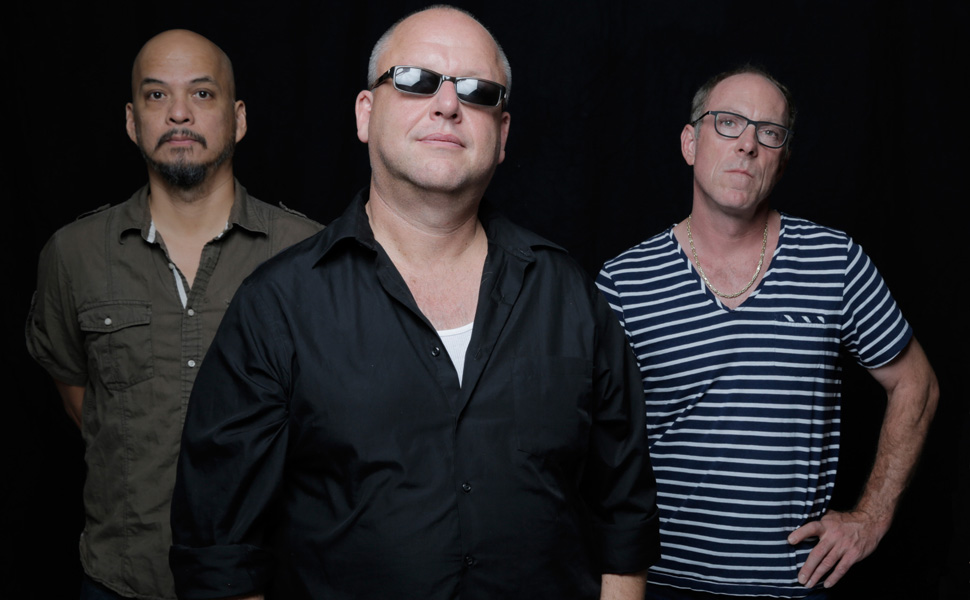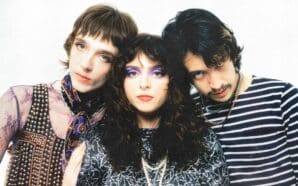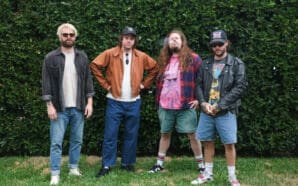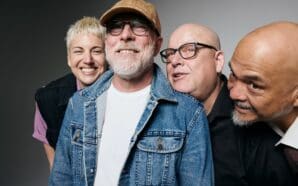Recent murmurings about Pixies would lead you to believe that the band is currently in a tumultuous, turmoil-y state of flux… which is only partly true… Last year bassist Kim Deal left the legendary Boston alternative rock outfit nine years into their “reunion,” just before they released their first new music in more than 20 years (sans 2004 single “Bam Thwok”). Deal was replaced by Kim Shattuck of The Muffs… although that lasted only briefly, and bass duties are currently being handled by Paz Lenchantin, known for her work with A Perfect Circle, Zwan, and The Entrance band. Last September saw the release of EP1, and January 3rd EP2 dropped without notice (EP3 is scheduled for an April 7th release date.)
The new music has critics and fans divided, with the likes of Pitchfork panning the band’s latest sounds, while NME is more than happy to have the legends recording again. Many fans have been mocking the band’s current lineup, calling them, “The Fake Pixies,” yet their current tour is almost completely sold out (The tour includes two Philadelphia stops this Friday, January 24th, with a full-scale gig at the Electric Factory and a Free at Noon at World Café Live that afternoon). And while this may all be a bit confusing, a recent chat with the hyper-jovial Pixies drummer David Lovering (he addressed me by name throughout the entire interview, a first for me) revealed that the current state of Pixies is actually quite comfortable.
Throughout our 20-minute chat I can hear the light-hearted Lovering’s smile through the phone as he discusses the future of the band, which has them playing festivals all over the world in (our) late spring/early summer: “I love touring, it’s an escape for me. We’re going to be playing some places we’ve never played before, like Tel Aviv and Moscow, but there’s not a particular place I’m most excited for, I just love being out.” And the live show itself sounds very ambitious (possibly their most ambitious yet) and, according to Lovering, Lenchantin would seem to directly contribute to that ambition: “We have 75 songs to pick from. About eight are new songs, but we make up a new setlist every night and I think it’s getting better and better. We have Paz on bass now and she’s unbelievable. She’s a professional bass player that intimidates me, like I have to sound so much better. We just have such a great rhythm section.”
So, to backtrack… In 2004 Lovering, Frank Black, Joey Santiago, and Kim Deal came together to play their first shows in more than a decade, beginning with a string of intimate dates in US B-markets in order to prep them for a set at Coachella. Subsequent legs were continually added to the reunion tour (that saw the once-commercially unviable act playing to up to 10,000 people a night), which lasted for well over a year and, despite members continuing to pursue non-Pixies endeavors, the band seemed to keep coming back together to play live, including several tours that had them celebrating sophomore LP Doolittle by playing the album in its entirety. But, according to the band, when their “reunion” started to near the decade mark, they felt they needed to start recording new music, so as not to be considered “a casino act,” as Lovering puts it.
Pixies’ recently released trio of EPs dropped independently, via their own website. And David says this wasn’t the first time the band took a shot at recording since reuniting: “We actually tried doing this previously, but it took about three years. We went to Boston and got into a recording studio, like we did in 1985, but that was a disaster. So, it’s taken some time, but it eventually worked out very well.” He also tells me that the transition back into being the Pixies was essentially effortless, even after nearly 25 years: “It’s the same thing the same way. [Frank Black] obviously writes the songs and then brings them to us, but as far as sounding like the Pixies, it’s the sounds of the individuals of the band that make us. And I think we’re all the same people. Nothing has changed at all.”
Lovering credits a lot of the success of the Pixies’ first recordings in more than two decades to producer Gil Norton (whom he lovingly refers to as “The Fifth Pixie,” having already produced their last three LPs: 1989’s Doolittle, 1990’s Bossanova, and 1991’s Trompe Le Monde): “Gil took us and said to us, ‘Imagine that you’ve been away from the planet for twenty years and you’re going to write something completely new,’ which is a tough thing for a band of our age, after a certain amount of time. He really pushed us and our sound.” And when I ask David about the biggest highlight of the Pixies’ second time around, which he points out has actually lasted longer than their first stint, he tells me, “The highlight is that we’ve become a much bigger band (laughs). I’m almost glad we broke up.”








